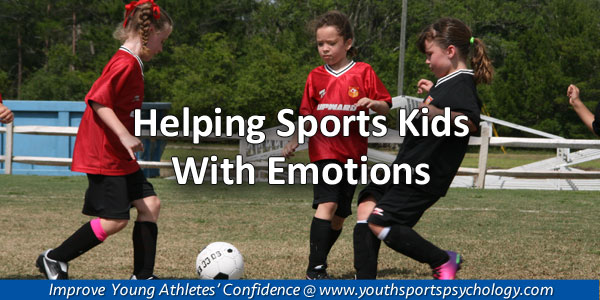Dealing With Emotional Kids Before Competition
A parent asks how to help her son recognize and name the different feelings he might have before a match and learn how to put them aside until later.
This is a good question. It’s important for young athletes to understand how they’re feeling—and how it might affect their confidence and composure during a game.
First of all, ask your sports kids how they’re feeling. But don’t tell them how they feel.
You might offer a few possibilities: nervous, calm, jittery, excited or anxious?
Step back and give them space to talk. Hopefully, by showing that you’re listening and open to what they have to say, they’ll be able to tell you how they feel.
If they say they’re feeling butterflies that generally go away once they start playing, that’s a good thing. They can use those butterflies to help them focus and play with more intensity.
However, if they say they’re wracked with worries about what others may think of their performance, fear of making mistakes, concerns about not meeting high expectations or other anxiety-producers, it’s important to help them figure out how to deal with these feelings.
Fear of failure is the most common source of stress or anxiety for athletes. Most athletes who are afraid to fail fear disappointing coaches, teammates, or parents. For example, many athletes worry about embarrassing themselves when they do not perform well.
Help kids understand that their fear of embarrassment or rejection is not always based in reality—even though the fear and anxiety feel very real.
For example, kids may think they have to perform perfectly or they’ll get benched, when in fact, their coach knows that some mistakes are inevitable.
Ask kids: What’s the worst thing that can happen if they get off to a poor start?
They should also put their fears aside by focusing on the here-and-now, or their pregame preparation.
You want them to relax and joke with their teammates or buddies before competition. They can listen to some music they like to distract them on the way to the game.
**Encourage them to keep things light and not so serious.**
When kids feel anxious, they should shift their attention to their game plan or visualizing performing well.
How do you want to play the first few minutes of the game? And you don’t want them to focus on possible scores or results. This tends to work some players into a state of anxiety.
Related Articles on Youth Sports:
- Feelings Can be Contagious in Youth Sports
- Addressing Outbursts in Youth Sports
- How to Resolve Conflicts in Youth Sports
*Subscribe to The Sports Psychology Podcast on iTunes
*Subscribe to The Sports Psychology Podcast on Spotify
Help Young Athletes Boost Confidence in Sports!
Every day, we receive letters from parents like you who want their children and teens to excel in sports. However, these parents can see fear, doubt, and frustration on the faces of their kids who struggle with the “inner” game of sports. But these parents have no idea how to help their kids overcome the worries, expectations and self-defeating thoughts that prevent their young athletes from feeling confident and successful.
You can benefit from our 15-plus years’ of work in sports psychology and sports parenting research. Now, you can tap into our secrets to sports success through a cutting-edge, 14-day program that helps young athletes overcome the top “mental game” challenges that sports parents face—and the top challenges young athletes face.


